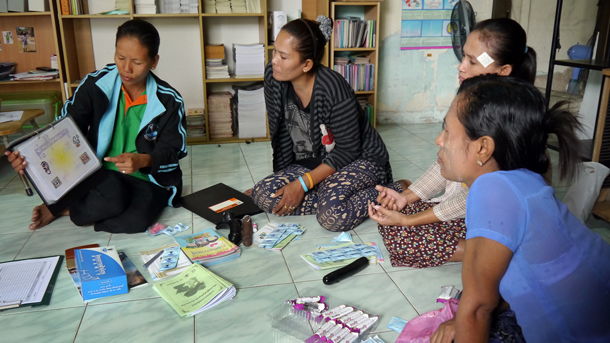CHIANG MAI, Thailand — Sex work is seen as a taboo subject by much of Burmese society, but over the border in Thailand, Burmese migrants make up a large share of male sex workers.
In the northern Thai city of Chiang Mai, Burmese migrants sell their bodies for sex at “show bars” or other entertainment venues. The bars are legal, but it is illegal for migrants to work at them. As a result, many male sex workers do not seek medical assistance if they contract sexually transmitted diseases because they do not want to reveal their source of income.
“A majority of the youths working at our bar are from Burma, between the ages of 18 and 25,” said an employee at one of the city’s best known gay bars, speaking on condition of anonymity.
He said that despite assumptions in the community that male sex workers are gay, some of the migrants were straight but had sex with men to support their families.
A large proportion of sex workers in Chiang Mai are from ethnic minority areas in Burma, including Shan, Kayah and Karen states. Ethnic minority states were ravaged by civil wars under Burma’s former military regime, forcing more than 130,000 civilians to flee to Thailand over the course of 20 years.
Burmese migrants from Shan State made up nearly half of 50 young male sex workers interviewed at massage parlors and bars in Chiang Mai for a report released earlier this year by Urban Light and Love 146, two NGOs that aim to end sexual exploitation and child trafficking.
“A young man earns between 20,000 and 40,000 baht [US$625 to $1,250] per month, working at the show bar,” a waiter at another gay bar told The Irrawaddy, also requesting anonymity for security reasons. He said waiters earned less money than male sex workers and usually acted as agents, arranging meetings with clients.
Male sex workers find clients in Chiang Mai’s famous tourist spots, including Santitham, Chiang Mai Land and Night Bazaar.
Their jobs are not usually long term.
“Many cannot maintain their youth. They leave after three years, at most,” said the waiter, who has more than a decade of experience in the industry.
He said many young sex workers turned to drugs or became infected with HIV. But employees at show bars said male sex workers were unlikely to ask for support from NGOs because they did not want to reveal they were breaking the law through their work.
Burmese migrants in Thailand are only legally allowed to work on construction sites and plantations, in shops, or as domestic helpers.
“Some boys refuse to go out with male clients at night because they do not want to be seen by their friends outside,” a bar employee said. “We have that problem at our bar. The clients call us and tell us, and we have to reimburse them.”
He said clients paid about 3,000 baht ($90) for a full-night session.
A migrant sex worker could be arrested and detained by the police, in addition to risking deportation.
“For security, the owners of the bar take care of it,” a Burmese waiter told The Irrawaddy, referring to bribes to authorities. “It costs about 4,000 baht to secure the release of a young show boy who was arrested during working hours.”
Two years ago, the Joint United Nations Program on HIV/AIDS, or UNAIDS, set a goal of “getting to zero” new infections and deaths from HIV by 2016.
“It has not been possible yet to reach the UNAIDS ‘getting to zero’ policy because Thailand’s health policy for migrants to receive ART has not been fully implemented at some hospitals,” said Hark Murng, a community health worker at the Migrant Assistance Program (MAP) in Chiang Mai. ART, or antiretroviral therapy, is a combination of antiretroviral (ARV) drugs to suppress HIV and stop the progression of the disease.
“In Thailand there was no policy before to provide ARV medication to migrant workers, but this year under the current health policy those migrants can apply for health insurance, paying a fee of 2,800 baht, and receive ARV medication,” he said.
The MAP Foundation refers male sex workers to receive medical support from other Thai NGOs. More than 100 men, women and children with HIV have received health and emotional support from the program, but Hark Murng said it was difficult to estimate the exact number.
“They are reluctant to talk openly about their problems,” he said.
He said his group works with ethnic Shan, Kachin, Burman, Karen, Akha and Lahu people.
Last month in Bangkok, nearly 4,000 delegates from 80 countries gathered to discuss HIV prevention at the 11th International Congress on AIDS in Asia and the Pacific (ICAAP11).
About 4.9 million people in the Asia and Pacific are infected with the virus, according to a report by UNAIDS.
















